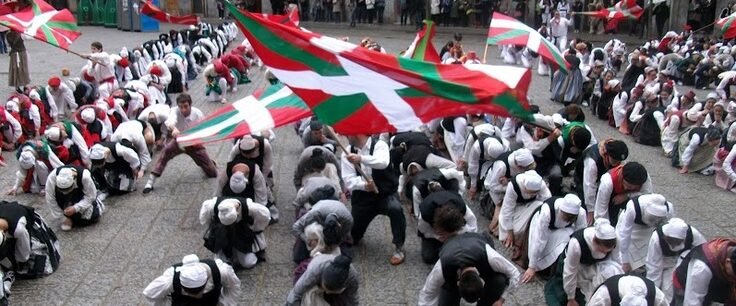The Essence of Basque Identity
The Basque identity, steeped in antiquity and uniqueness, stands as a testament to a rich cultural heritage that has weathered the sands of time. Originating from one of the oldest communities in Europe, the Basque people boast a history that pre-dates Roman occupation, having established their presence in the region for millennia. Central to this identity is the language, Euskara, which remains an enigmatic enigma as it has no known linguistic relatives. This ancient tongue is not merely a means of communication but a core pillar of Basque cultural preservation, mirroring the people’s determination to maintain their distinctive identity amidst external influences.
Geographically, the Basque Country spans portions of northern Spain and southwestern France, characterized by its diverse landscapes ranging from rugged coastlines to verdant mountains. This varied topography has historically provided a natural fortification, allowing the Basque culture to flourish in relative isolation. Despite numerous attempts through the centuries by various empires to assimilate them, such as the Romans, Visigoths, and even modern states, the Basques have selectively absorbed external influences, fusing them with their own traditions to enrich, rather than erode, their cultural fabric.
Symbolism plays a crucial role in the Basque cultural narrative. The lauburu, a four-headed Basque cross, and the ikurriña, the vibrant Basque flag, are omnipresent symbols that evoke a deep sense of pride and belonging among the Basque people. Traditional attire further reinforces this identity, with the txapela (Basque beret) being a particularly iconic garment. Additionally, cultural practices such as the Basque festivals, folk dances, and pilota (a traditional Basque sport) illustrate the community’s social cohesion and continuity.
Moreover, Basque gastronomy forms an integral element of their identity. Known for its robust and flavorful cuisine, the Basque Country has garnered international acclaim, particularly for its pintxos (small snacks similar to tapas) and delectable seafood dishes. These culinary specialties, underscored by a deep-rooted tradition of communal eating and celebration, underscore the significance of food in maintaining and transmitting Basque culture across generations.
Basque Gatherings: Festivals, Community, and Togetherness
The Basque people have long been known for their rich cultural traditions, which are often celebrated through various vibrant community gatherings. Among the most prominent festivals is Aste Nagusia, or the Great Week, held in Bilbao each August. Aste Nagusia is a grand spectacle that began in 1978, showcasing an explosion of local music, traditional Basque dances, theatrical performances, and delicious food. The festivities kick off with the launch of the traditional Marijaia effigy, a vital symbol of the festival’s spirit of fun and togetherness.
The ensuing Semana Grande, or Big Week, features a wide array of distinctly Basque activities. From lively street parades to exhilarating sport competitions, Semana Grande epitomizes the communal energy and cultural pride of the Basque region. Similarly, one cannot overlook the Tamborrada, celebrated on January 20th in San Sebastián, where thundering drumbeats fill the air as participants don traditional attire, paying homage to their historical roots.
Yet, Basque cultural togetherness extends beyond these well-known festivals. Pelota, a traditional Basque sport similar to handball, is often at the heart of community gatherings. Matches not only offer thrilling entertainment but also serve as avenues for social bonding, where spectators and players alike engage in vibrant festivity. Equally significant is bertsolaritza, the unique Basque tradition of improvised sung poetry. This oral artistry remains a cornerstone of Basque gatherings, with performers captivating audiences while reinforcing their linguistic and cultural heritage.
Community centers, known as ‘txokos,’ or gastronomic societies, play a crucial role in the tapestry of Basque social life. These hubs bring people together to cook, eat, and engage in hearty conversation, upholding the values of hospitality and unity that are integral to Basque culture. In these intimate settings, the importance of shared meals and communal activities is evident, fostering a sense of belonging and continuity.
Through these festivals, sports, and social gatherings, the Basque people not only celebrate but also preserve and perpetuate their rich cultural legacy. Emphasizing hospitality, unity, and communal joy, these traditions serve as living expressions of Basque identity, nurturing a profound sense of community that is passed down through generations.



